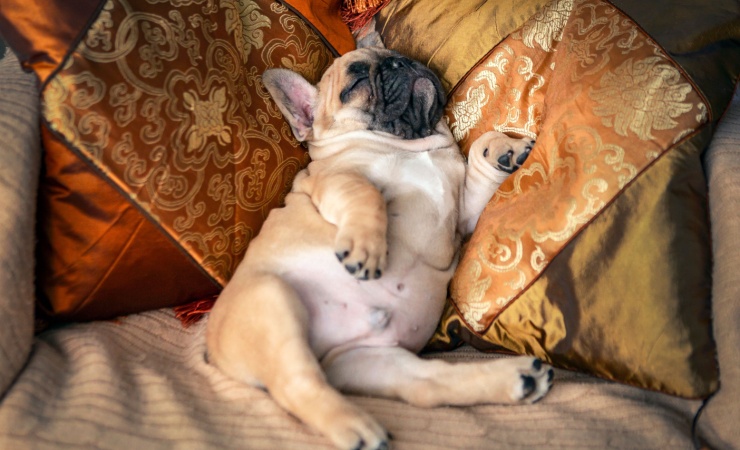Dog Sleep Habits: How Much is Normal & When to Worry
Dog Sleep Habits: How Much is Normal & When to Worry

If your dog spends most of their day curled up in bed, you’re not alone wondering: Is all this sleep normal? Short answer- usually, yes. Dogs aren’t just napping because they’re bored; their sleep needs are significantly higher than ours. But there’s more to the story. Sleeping in dogs isn’t one-size-fits-all. It varies by age, breed, lifestyle, and health. Understanding your dog’s sleep habits is key to spotting red flags early and ensuring they’re getting the rest they need—without sleeping their life away.
How Much Sleep Is Normal?
On average, adult dogs sleep between 12 to 14 hours a day. Puppies and senior dogs need even more, often 18 to 20 hours daily. This might sound like a lot, but it’s rooted in biology. Unlike humans, dogs cycle through sleep faster and spend less time in REM. This means they need more total sleep to feel rested. Their lifestyle also contributes to dogs not following a rigid sleep-wake cycle like we do. They nap throughout the day, especially when their humans are at work or during quiet periods.
Factors That Influence Sleep Time
1. Age:
Puppies grow rapidly and need long naps for proper development. Adult dogs tend to balance bursts of activity with downtime. Senior dogs may slow down and sleep more due to decreased energy and underlying conditions like arthritis.
2. Breed:
Larger breeds like Saint Bernards, Mastiffs, and Newfoundland are famously sleepy. They’re prone to longer naps and more frequent rest periods. In contrast, smaller breeds and working dogs like Border Collies are more energetic and require less sleep.
3. Activity Level:
An active dog who gets enough exercise tends to sleep more soundly and predictably. On the flip side, dogs with limited stimulation may sleep out of boredom.
4. Diet:
Just like in humans, what your dog eats impacts their energy. A poor diet can leave them sluggish, while a well-balanced one supports healthy energy levels and rest.
5. Weather:
You may notice your dog sleeps more during rainy days or when it’s cold out. That’s normal; dogs often adjust their rest based on comfort and ambient temperatures.
When Sleep Might Be a Red Flag
Occasional sleepy days are fine. But if your dog’s sleep patterns suddenly change or if sleep is paired with other symptoms, it may point to something more serious. Watch out for:
• Excessive lethargy or unresponsiveness
• Labored breathing while resting
• Changes in appetite or weight
• Reluctance to move or play
• Restless pacing at night (especially in seniors)
Conditions like hypothyroidism, diabetes, heart disease, or pain from arthritis can all affect sleep. If something feels “off,” it’s best to consult your vet. This is where Pet insurance becomes invaluable. It helps you act quickly without worrying about out-of-pocket vet costs, especially when symptoms require lab tests or long-term treatment.
Can Dogs Sleep Too Little?
Absolutely. Just like too much sleep can be a concern, so can restlessness or insomnia. Anxiety, noise, digestive discomfort, or lack of exercise can keep a dog up. Restless sleep in older dogs may also signal cognitive decline. Creating a consistent routine, limiting late-night feeding, and offering calming enrichment (like chew toys or snuffle mats) can support better sleep hygiene for your dog.
How to Support Healthy Sleep Habits
• Offer consistent sleep spaces:
A designated bed or crate in a quiet area helps dogs relax.
• Stick to a daily routine:
Regular walks, meals, and playtimes help regulate your dog’s internal clock.
• Watch the caffeine:
Many human snacks contain caffeine or stimulants that can harm dogs. Keep your coffee, chocolate, and energy drinks far out of reach.
• Get regular checkups:
Sleep can be a subtle health indicator. An annual exam can catch changes before they become major issues. And while you’re planning your dog’s wellness routine, having dog insurance ensures you’re covered in case their excessive sleep turns out to be more than just a nap.
Final Thoughts
Most of the time, your dog’s love of sleep is completely normal—even adorable. It’s how they restore energy, stay balanced, and process the world around them. But understanding what’s typical for your pup—and knowing when something feels off—can make all the difference. So, the next time you catch your dog snoring on the couch for the fifth time today, smile. They’re just doing what dogs do best: living the dream.
Disclaimer: The above information is for illustrative purposes only. For more details, please refer to the policy wordings and prospectus before concluding the sales.
RELATED ARTICLES
Choosing The Best Travel Carriers for Cats and Small Dogs
How Owning a Dog Can Improve Your Mental and Physical Health
A Guide to Handle Separation Anxiety in Dogs
How to Train Your Cat Using Positive Reinforcement Techniques
Understanding Seasonal Changes in a Cat’s Behavior










 Health Insurance
Health Insurance  Travel Insurance
Travel Insurance  Car Insurance
Car Insurance  Cyber Insurance
Cyber Insurance  Critical Illness Insurance
Critical Illness Insurance
 Pet Insurance
Pet Insurance
 Bike/Two Wheeler Insurance
Bike/Two Wheeler Insurance  Home Insurance
Home Insurance  Third Party Vehicle Ins.
Third Party Vehicle Ins.  Tractor Insurance
Tractor Insurance  Goods Carrying Vehicle Ins.
Goods Carrying Vehicle Ins.  Passenger Carrying Vehicle Ins.
Passenger Carrying Vehicle Ins.  Compulsory Personal Accident Insurance
Compulsory Personal Accident Insurance  Travel Insurance
Travel Insurance  Rural
Rural 











